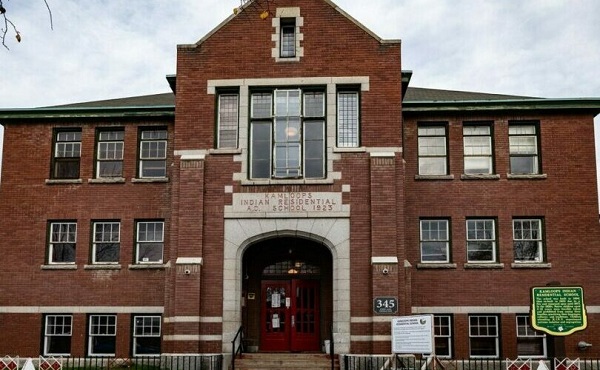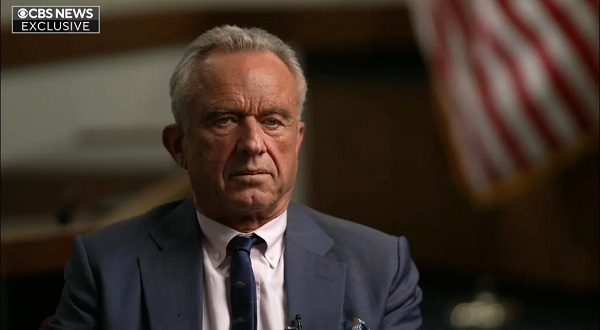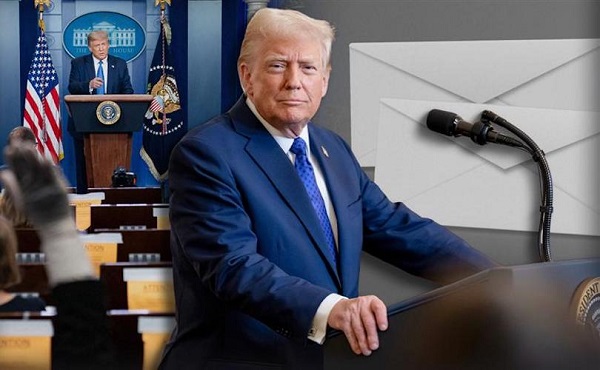Great Reset
From Border Security to Big Brother: Social Media Surveillance

 By Christina Maas
By Christina Maas
Was the entire immigration reform rhetoric just a prelude to broadening government spying?
Let’s take a closer look: immigration became a hot-button campaign issue, with plenty of talk about “welcoming” migrants, combined with a healthy dose of hand-wringing about border security. Now, however, critics are uncovering what looks like the real priority—an enhanced federal surveillance operation aimed at monitoring not just new arrivals, but American citizens too. In the name of keeping tabs on who’s coming and going, the administration sank more than $100 million into a social media surveillance system designed to keep an eye on everyone.
The Department of Homeland Security (DHS) first flirted with these powers under Trump’s presidency, when ICE officials began monitoring social media under the guise of protecting the homeland. The Biden-Harris administration, having previously expressed horror at Trump-era excesses, took a softer tack, but actually increased mass surveillance. They rebranded the initiative as the Visa Lifecycle Vetting Initiative (VLVI), a name that practically exudes bureaucratic charm while implying a methodical, visa-centric approach. But if it was just an immigration program, why was it scanning communications between Americans and their international friends, family, or business contacts?
According to a lawsuit from the Electronic Frontier Foundation (EFF), the program evolved into something much larger than a mere visa vetting system. The scheme entailed broad surveillance of communications and social media activity, conveniently sidestepping pesky things like “probable cause” or the First Amendment. “Government officials peering through their correspondence with colleagues visiting from overseas and scrutinizing the opinions expressed in their communications and their work,” read a lawsuit that laid bare the VLVI’s invasive nature. What started as a system to vet foreigners’ eligibility to enter the U.S. quietly metastasized into an excuse to monitor anyone who dared connect across borders.
We obtained a copy of the lawsuit for you here.
We obtained a copy of documents batch one for you here.
We obtained a copy of documents batch two for you here.
Of course, in true Washington style, this story wouldn’t be complete without a twist of political theater. The administration’s rhetoric has leaned heavily on a supposed dedication to protecting civil rights and personal freedoms—while simultaneously doubling down on programs that do the opposite.
A Little Privacy, Please? DHS Puts American Social Media on the Watchlist
Ah, the Fourth Amendment — one of those quaint, old-timey Constitutional protections that grant Americans the basic human right not to be poked, prodded, or probed by their own government without a solid reason. It’s a promise that Washington will think twice before sifting through your life without a warrant. Yet somehow, in the age of social media, this Fourth Amendment right seems to be slipping into the hazy realm of memory, particularly when it comes to Uncle Sam’s latest pastime: keeping tabs on everyone’s online chatter under the banner of immigration vetting.
Welcome to the VLVI, a Homeland Security special that appears to have mistaken “security” for “surveillance.” This bureaucratic marvel was dreamed up as a means to monitor non-citizens and immigrants, ostensibly for national security. But according to recent lawsuits, it’s not just foreigners on the watchlist—average Americans now get to share the surveillance limelight too, all thanks to the Department of Homeland Security’s fondness for “indiscriminate monitoring” of citizen communications. And why? Because in the brave new world of VLVI, any American chatting online with an overseas connection might just be suspicious enough to keep an eye on.
A Sweeping “Security” Measure or Just Mass Surveillance?
Here’s where the Constitution starts to feel like an afterthought. Traditionally, the government can’t simply jump into your emails, texts, or online rants without a warrant backed by probable cause. The Fourth Amendment makes that pretty clear. But in the VLVI’s playbook, this notion of “probable cause” becomes something of a suggestion, more of a “nice to have” than a constitutional mandate. Instead, they’ve embraced an approach that’s less “laser-focused security effort” and more “catch-all dragnet,” casting wide nets over American citizens who happen to connect with anyone abroad—no illegal activity necessary.
Imagine you’re a US citizen messaging your friend in France about a summer trip, or maybe you’re just exchanging memes with a cousin in Pakistan. Under this initiative, that simple exchange could land you in a Homeland Security database, your innocent messages cataloged alongside the truly suspicious characters of the internet. And this is happening without any individual warrants, without specific suspicion, and in some cases, without probable cause. One might ask, exactly how does that square with the Constitution’s protections?
Privacy Protections? That’s for Other People
This is all a question of government trust and hypocrisy. The program began under a previous administration but was quickly shuttled along by the current one, despite its public stance championing privacy rights. There’s something ironic about politicians who rally for civil liberties in campaign speeches, only to maintain and expand government surveillance in office. The backlash has been predictably loud, and for good reason. Here we have a policy that effectively treats every social media user as a latent threat and a government that somehow expects people to swallow this as reasonable.
Critics have slammed this “watch-all” approach, pointing out that it doesn’t take a legal scholar to see how this might just cross a constitutional line or two. It’s not just Americans with foreign friends who are worried—it’s anyone who believes the government shouldn’t rummage through citizens’ lives without cause. “This type of program, where citizens’ digital lives are surveilled under a sweeping policy without individual warrants or specific reasons, sounds like an unreasonable search,” privacy advocates say.
The Price of a Free Society: Now With Less Freedom
Of course, VLVI supporters wave away these concerns with a dismissive “it’s for security” mantra as if that excuse covers every constitutional breach. And true, there’s little doubt that some level of monitoring is necessary to keep the truly dangerous elements out of the country. But we’re talking about ordinary people here, law-abiding citizens getting swept up in a bureaucratic machine that fails to distinguish between a casual chat and a credible threat.
When the government can tap into anyone’s social media profile because of a flimsy association, what’s left of the citizen’s “reasonable expectation of privacy”? In theory, the Fourth Amendment protects it; in practice, programs like VLVI gnaw away at it, one seemingly “harmless” violation at a time. If we keep pretending this is just another harmless tool in the security toolkit, we might as well hang up any remaining illusions about the privacy rights we’re supposedly guaranteed.
Just Another Step Toward a Surveillance State?
For Americans, it’s a chilling reminder that a swipe on Instagram or a chat on Facebook can mean more than just casual social interaction. For the DHS, it seems the message is clear: treat everyone as a suspect first, and figure out the legalities later. What happens to the expectation of privacy for ordinary Americans? It’s probably time we all start looking over our digital shoulders, because in the world of VLVI, “reasonableness” is a government privilege, not a citizen’s right.
Censorship Industrial Complex
Former residential school student refutes ‘genocide’ claims, recalls positive experience

From LifeSiteNews
An Indigenous whistleblower condemned the media-driven narrative about ‘mass’ graves at residential schools that led to church burnings across Canada.
An Indigenous whistleblower shared his positive experience at a Residential school, debunking the claim that the schools abused and murdered their students.
In an April 5 interview with Rebel News reporter Drea Humphrey, a Kamloops Band member and former Kamloops Indian Residential School student revealed that there was no”genocide” at the schools and many students benefited from the institution.
“A lot of the students were happy to be there,” the Band member, whose identity was kept anonymous, said. “They were away from abusive families, dysfunctional families, alcoholism. So, they were happy to be there.”
The former student revealed that he was treated well during his time at the residential schools in the 1970s. He also described the priests and nuns who ran the school as good people, referring to Father Noonan, the principal at the time, as “a real nice guy.”
Residential schools, while run by both the Catholic Church and other Christian churches, were mandated and set up by the federal government and ran from the late 19th century until the last school closed in 1996.
While some children did tragically die at the once-mandatory boarding schools, evidence has revealed that many of the children passed away as a result of unsanitary conditions due to underfunding by the federal government, not the Catholic Church.
As a consequence, since 2021, when the mainstream media ran with inflammatory and dubious claims that hundreds of children were buried and disregarded by Catholic priests and nuns who ran some of the schools, over 100 churches have been burned or vandalized across Canada in seeming retribution.
However, to date, there have been no mass graves discovered at any residential schools across Canada.
The Band member revealed that the Kamloops Band knows they “made a mistake” in labeling the ground anomalies as “unmarked graves.”
In fact, according to the Band member, in the 1990s, the Band used the supposed location of the 215 child graves for their new Powwow Arbour and Heritage Park. The project was only allowed to continue after studies concluded that there were no artifacts or archaeological remains at the site.
Therefore, if there were mass graves at that location, they would have been discovered in the 1990s, not in 2021.
The Band member revealed that he does not believe a “genocide” took place at residential schools, while condemning the church burnings across Canada.
“When I was growing up religion and church meant community and family,” he explained. “It seems like the Liberals want to destroy family so the way to do that is to attack religion.”
“Attacking religion was a good excuse to burn the churches,” he said.
Regardless of his testimony and the lack of evidence to support the claim, mainstream media outlets perpetuate the “mass graves” narrative and even threaten to punish those who oppose it. In November, CBC subtly suggested that “residential school denialism” should be criminalized.
MAiD
Disability rights panel calls out Canada, US states pushing euthanasia on sick patients

From LifeSiteNews
Physician-assisted suicide programs in the US and Canada are discriminating against patients with serious medical conditions according to a panel discussion at the Religion News Association.
Physician-assisted suicide programs in the United States and Canada are discriminating against patients with serious medical conditions even when their cases are not terminal, in many cases pushing to end their lives for financial reasons rather than medical.
Catholic News Agency reported that a panel of disability-rights advocates recently examined the landscape of the issue during the Religion News Association’s 2025 annual conference. During the panel, Patients Rights Action Fund (PRAF) executive director Matt Vallière accused state euthanasia programs of discriminating against patients with life-threatening conditions in violation of the Americans with Disabilities Act, noting that when a state will “will pay for every instance of assisted suicide” but not palliative care, “I don’t call that autonomy, I call that eugenics.”
Inclusion Canada CEO Krista Carr, meanwhile, discussed her organization’s lawsuit against the expansion of Canada’s medical assistance in dying (MAID) program to “people with an incurable disease or disability who are not dying, so they’re not at end of life and their death is not reasonably foreseeable.”
More astonishingly, she added, this “funded right” to lethal injection is slated to be expanded to mental illness in 2027.
“By setting out a timeline of three years, it’s an indication that the systems need to move towards readiness in two years. There’s the opportunity to do another review, and to assess the readiness of the system through a parliamentary process,” Health Minister Mark Holland said in February of the move, which Dying with Dignity Canada presents as a matter of “equality” for “those whose sole underlying condition is a mental illness.”
“It’s being called a choice,” but “it’s not a choice,” Carr said. Rather, these programs are pushing the “choice” on patients in “a desperate situation where they can’t get the support they need.”
As LifeSiteNews recently covered, the “most recent reports show that (medical assistance in dying) is the sixth highest cause of death in Canada. However, it was not listed as such in Statistics Canada’s top 10 leading causes of death from 2019 to 2022.”
In America, nine states plus the District of Columbia currently allow assisted suicide.
Support is available to talk those struggling with suicidal thoughts out of ending their lives. The American Suicide & Crisis Lifeline and the Canadian Suicide Crisis Helpline can both be reached by calling or texting 988.
-

 2025 Federal Election2 days ago
2025 Federal Election2 days agoResearchers Link China’s Intelligence and Elite Influence Arms to B.C. Government, Liberal Party, and Trudeau-Appointed Senator
-

 Business2 days ago
Business2 days agoTimeline: Panama Canal Politics, Policy, and Tensions
-

 COVID-192 days ago
COVID-192 days agoFauci, top COVID officials have criminal referral requests filed against them in 7 states
-

 2025 Federal Election2 days ago
2025 Federal Election2 days agoPoilievre Announces Plan To Cut Taxes By $100,000 Per Home
-

 Health2 days ago
Health2 days agoRFK Jr. Shuts Down Measles Scare in His First Network Interview as HHS Secretary
-

 Health2 days ago
Health2 days agoRed Deer Hospital Lottery – Previous Supporter Draw Deadline!
-

 Bjorn Lomborg2 days ago
Bjorn Lomborg2 days agoThe stupidity of Net Zero | Bjorn Lomborg on how climate alarmism leads to economic crisis
-

 International2 days ago
International2 days agoTrump White House will ignore reporter emails that include ‘preferred pronouns’ in signature





